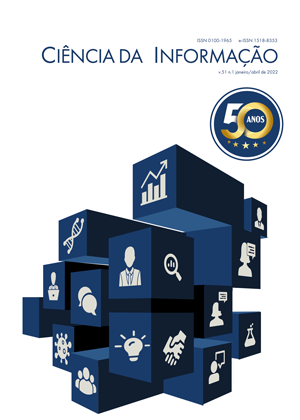Informational accessibility for people with functional diversity: Library of the Complutense University of Madrid: Case study
DOI:
https://doi.org/10.18225/ci.inf.v51i1.5614Keywords:
Informational accessibility; web accessibility; University Library; disability; functional diversityAbstract
Meeting the needs of groups with functional diversity in all areas of personal and social development will contribute to the assimilation of the diversity bias in society, enriching it and bringing it closer to reality. The article analyzes the situation of information accessibility for people with functional diversity in the Library of the Complutense University of Madrid. The objective is to determine the balance between needs and available services, and to make a proposal for improvement. In the methodology we highlight the priority use of a qualitative research technique, the interview, carried out with a sample of students with functional diversity and administration and services personnel linked to the care of this group. Among the results obtained we can point out that the Complutense University is committed to the inclusion of diversity; The Library has collections, resources and services for students with functional diversity; there are no major claims by students to improve information accessibility in the Library. However, it has also been discovered that this group uses the Library little and is unaware of its general and special services. The Complutense University Library is on the way to being fully inclusive for people with functional diversity, but it lacks a policy that combines actions and completes its services, a communication plan to connect with this group, and move from a passive role to a proactive one.
Downloads
References
BIBLIOTECA DE LA UNIVERSIDAD COMPLUTENSE. 2018. Servicios para discapacitados. Disponible en: http://biblioteca.ucm.es/serviciosdiscapacitados. Acceso en: 28 nov.2020.
BIBLIOTECA DE LA UNIVERSIDAD COMPLUTENSE Estadísticas de la Biblioteca de la Universidad Complutense. 2018. Disponible en: http://webs.ucm.es/BUCM/intranet/doc22068.xlsx. Acceso en: 28 nov.2020.
CASASOLA BALSELLS, L. A.; GUERRA GONZÁLEZ, J. C.; CASASOLA BALSELLS, M. A.; PÉREZ CHAMORRO, V. A. 2017. “La accesibilidad de los portales web de las universidades públicas andaluzas”. Revista Española de Documentación Científica, 40 (2).
CONSEJO SUPERIOR DE INVESTIGACIONES CIENTÍFICAS (CSIC), 2011. Código de Buenas Prácticas Científicas. Disponible en: https://www.csic.es/es/el-csic/etica/etica-en-la-investigacion. Acceso en: 28 nov.2020.
CUEVAS CERVERÓ, A; SIMEÃO, E. 2011. Alfabetização informacional e inclusão digital: modelo de infoinclusão social. Brasilia: Thesaurus.
CUEVAS CERVERÓ, A.; RAZQUÍN ZAZPE, P.; PARRA VALERO, P.; GÓMEZ HERNÁNDEZ, J. A.; BARRIOS MARTÍNEZ, C. 2018. “Accesibilidad informacional y diversidad funcional en el contexto universitario: el caso de la Universidad Complutense de Madrid”. In: Parra Valero, P.; Cuevas Cerveró, A; Simeão, E.; Gómez Hernández, J.A. (Coord.). Competencia en Información y Políticas para Educación Superior: Estudos Hispano-Brasileiros. Volumen I. Madrid: Universidad Complutense de Madrid, 2018: 155–161.
DESLANDES, S. F. 1994. O projeto de pesquisa como exercicio científico e artesanato intelectual. En: Minayo, M. C. de S. (Org.) Pesquisa social: teoria, método e criatividade. Rio de Janeiro: Vozes, 31-60.
FUNDACIÓN GENERAL UNIVERSIDAD COMPLUTENSE DE MADRID. 2017. Estatutos de la Universidad Complutense de Madrid. Disponible en: https://www.ucm.es/data/cont/docs/32-2017-06-13-20170223_estatutos_fgucm.pdf. Acceso en: 28 nov.2020.
FUNDACIÓN UNIVERSIA. 2018. Guía de atención a la discapacidad en la Universidad. Boadilla del Monte (Madrid): Fundación Universia.
CONSEJO DE COOPERACIÓN BIBLIOTECARIA. Grupo estratégico para el estudio de prospectiva sobre la biblioteca en el nuevo entorno informacional y social. 2013. Prospectiva 2020: Las diez áreas que más van a cambiar en nuestras bibliotecas en los próximos años. Madrid: CCB.
MINAYO, M. C. DE S. (Org.) 1994. Pesquisa social: teoria, método e criatividade. Rio de Janeiro: Vozes.
OBSERVATORIO DE LA ACCESIBILIDAD. 2018. Observatorio de la accesibilidad, 2018. Disponible en: https://www.observatoriodelaaccesibilidad.es. Acceso en: 26 dic. 2018.
OBSERVATORIO SOBRE DISCAPACIDAD Y MERCADO DE TRABAJO EN ESPAÑA. 2018. Informe general de la situación de las personas con discapacidad en el mercado laboral. Madrid: ODISMET.
ORERA ORERA, L. 2007.La biblioteca universitaria ante el nuevo modelo social y educativo. El Profesional de la Información. 16 (4): 329–337.
PALACIOS, A.; ROMAÑAC, J. 2006. El modelo de la diversidad. La Bioética y los Derechos Humanos como herramientas para alcanzar la plena dignidad en la diversidad funcional. La Coruña: Diversitas.
REBIUN. Definición de Biblioteca. 2013. Disponible en: http://www.rebiun.org/sites/default/files/2017-11/2013. Acceso en: 28 nov.2020.
ROMAÑACH, J. 2009. Bioética, al otro lado del espejo. Santiago de Compostela: Diversitas.
Universidad de Salamanca. Servicio de información sobre discapacidad. 2018. Accesibilidad informacional, 2018. Disponible en: http://sid.usal.es/areas/discapacidad/accesibilidad-ayudas-tecnicas/accesibilidad-informacion-comunicacion.aspx. Acceso en: 28 nov.2020.
TÉRMENS GRAELLS, M.; BARRIOS CERREJÓN, M.; DÍAZ BOLADERAS, M.; GUASCH MURILLO, D.; PONSA ASENSIO, P.; RIBERA TURRÓ, M. 2008. Study of the accessibility of scientific documents in digital media. Revista Española de Documentación Científica, 31(4): 552–572, 2008.
UNESCO. 1971. Actas de la16ª Conferencia General UNESCO. Volumen I: Resoluciones. París: UNESCO.
W3C. 2005. Web Accessibility.Disponible en: https://www.w3.org/WAI. Acceso en: 28 nov.2020
Downloads
Published
Issue
Section
License
Copyright (c) 2022 Aurora Cuevas-Cerveró, Cristina Barrios Martínez

This work is licensed under a Creative Commons Attribution-ShareAlike 4.0 International License.
- This publication reserves the right to modify the original, regarding norms, spelling and grammar, in order to maintain the standards of the language, still respecting author writing style;
- The final proofs will not be sent to the authors;
- Published works become Ciência da Informação's property, their second partial or full print being subject to expressed authorization by IBICT's Director;
- The original source of publicaton must be provided at all times;
- The authors are solely responsible fo the views expressed within the article;
- Each author will receive two hard copies of the issue, if made availalbe in print.




























